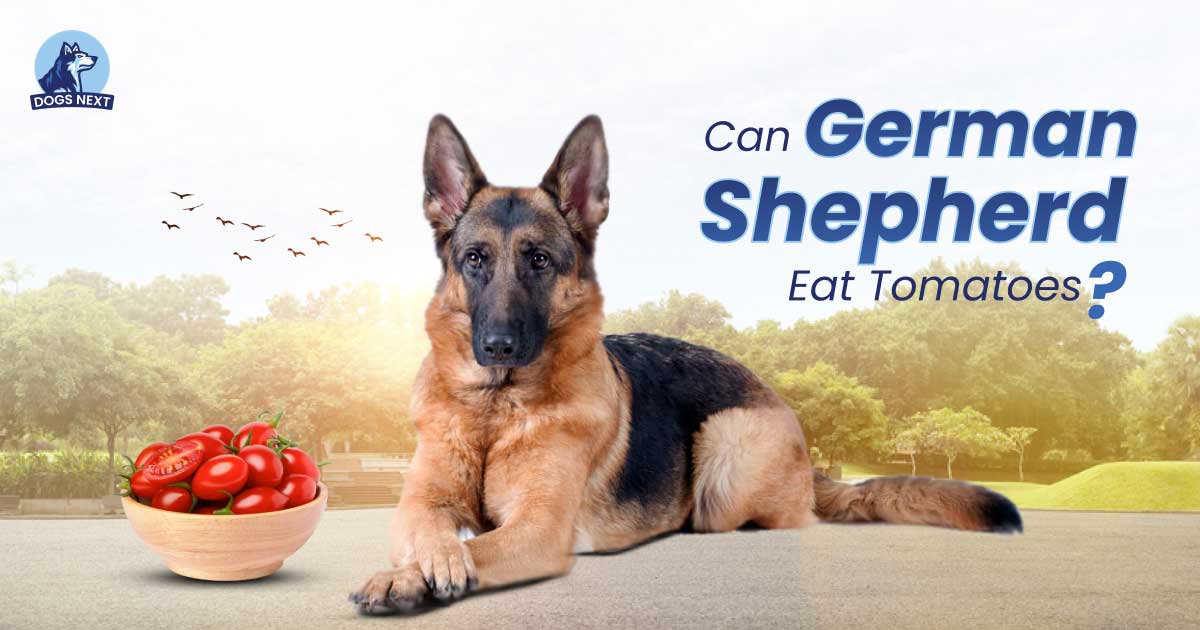Yes, German Shepherds can eat tomatoes in moderation. Ensure tomatoes are ripe and avoid green parts and stems.
Tomatoes can be a healthy treat for German Shepherds when given in small amounts. Ripe tomatoes provide essential nutrients like vitamins A and C, which support immune function and vision. Always remove any green parts, leaves, and stems, as they contain solanine, a compound toxic to dogs.
Avoid giving them canned or processed tomatoes, which often contain harmful additives and preservatives. Fresh, ripe tomatoes can be a safe and nutritious addition to your dog’s diet, but always consult your vet before introducing new foods. Providing tomatoes occasionally can contribute to a balanced diet for your German Shepherd.
Nutritional Benefits Of Tomatoes
Tomatoes are a common vegetable found in many households. But can German Shepherds eat tomatoes? Yes, they can, but in moderation.
Tomatoes offer several nutritional benefits that can enhance your dog’s diet. Let’s explore the nutritional benefits of tomatoes for German Shepherds.
Vitamins And Minerals In Tomatoes
Tomatoes are packed with essential vitamins and minerals. These nutrients are beneficial for your German Shepherd’s health. Here are some key vitamins and minerals found in tomatoes:
- Vitamin C: Helps boost the immune system and promotes healthy skin.
- Vitamin A: Supports vision, growth, and the immune system.
- Vitamin K: Important for blood clotting and bone health.
- Potassium: Helps maintain proper heart and muscle function.
- Folate: Essential for DNA synthesis and repair.
Below is a table summarizing the nutritional content of 100 grams of tomatoes:
| Nutrient | Amount |
| Vitamin C | 13.7 mg |
| Vitamin A | 42 µg |
| Vitamin K | 7.9 µg |
| Potassium | 237 mg |
| Folate | 15 µg |
Antioxidant Properties
Tomatoes are rich in antioxidants. These compounds protect cells from damage. This is especially important for German Shepherds as they are active dogs.
Key antioxidants in tomatoes include:
- Lycopene: This gives tomatoes their red color. It is effective in reducing inflammation and oxidative stress.
- Beta-Carotene: Converts into Vitamin A in the body. It helps improve vision and immune function.
- Vitamin C: Also acts as an antioxidant. It helps neutralize free radicals and strengthens the immune system.
Antioxidants are vital for dogs with high activity levels. They help reduce muscle fatigue and support overall health.
Including a small amount of tomatoes in your German Shepherd’s diet can provide these antioxidant benefits. Always ensure tomatoes are ripe and free from stems and leaves. These parts contain solanine, which is toxic to dogs.
Are Tomatoes Safe For German Shepherds?
Tomatoes are a staple in many households, often featured in salads, sauces, and snacks. But if you have a German Shepherd, you might wonder, can German Shepherds eat tomatoes? Are tomatoes safe for German Shepherds? The answer is not straightforward. Tomatoes can be both safe and risky for your canine friend, depending on various factors. Let’s explore this topic in detail.
Safe Parts Of The Tomato
Not all parts of the tomato plant are harmful to your German Shepherd. The ripe, red fruit of the tomato is generally safe for dogs to eat in moderation. Ripe tomatoes are low in calories and packed with vitamins. Here are some safe aspects of ripe tomatoes:
- Rich in Vitamins: Ripe tomatoes are high in vitamins A, C, and K.
- Low in Calories: Makes for a healthy treat.
- Antioxidants: Contains lycopene which is good for health.
It’s crucial to offer only the ripe, red parts to your German Shepherd. Green tomatoes or unripe parts can be dangerous. Always wash the tomatoes thoroughly to remove any pesticides or chemicals.
| Tomato Part | Safe for German Shepherds? |
| Ripe Red Fruit | Yes |
| Green Parts (Stem, Leaves) | No |
| Unripe Green Fruit | No |
Potential Risks And Toxicity
Tomatoes belong to the nightshade family and contain toxic substances. The primary concern is a compound called tomatine, found in higher concentrations in the green parts of the plant. Here are some potential risks:
- Tomatine Poisoning: Can cause weakness, confusion, and digestive issues.
- Allergic Reactions: Some dogs might be allergic to tomatoes.
- Choking Hazard: Small pieces can be a choking hazard.
If your German Shepherd eats the green parts or unripe tomatoes, watch for symptoms like vomiting, diarrhea, and lethargy. Contact your vet immediately if these signs appear.
Feeding tomatoes in large quantities can cause stomach upset. Stick to small, occasional treats to ensure your dog’s safety.
Here’s a quick summary of the risks:
| Risk | Symptoms |
| Tomatine Poisoning | Vomiting, Diarrhea, Lethargy |
| Allergic Reaction | Itching, Swelling, Breathing Issues |
| Choking Hazard | Difficulty Breathing, Coughing |
Solanine And Tomatine In Tomatoes
German Shepherds are known for their loyalty and intelligence. Pet owners often wonder about the safety of various foods.
Tomatoes are a common concern due to compounds like solanine and tomatine. Understanding these substances is crucial for your dog’s health.
Understanding Solanine And Tomatine
Tomatoes contain two key compounds: solanine and tomatine. These are natural glycoalkaloids found in the nightshade family. They serve as a defense mechanism for the plant.
Solanine is primarily found in the green parts of the tomato plant. This includes stems, leaves, and unripe tomatoes. Tomatine is found in higher concentrations in green tomatoes and less in ripe ones.
- Solanine: Found in green parts; can cause toxicity.
- Tomatine: Present in both green and ripe tomatoes, but higher in green ones.
While ripe tomatoes have lower levels of these compounds, they are generally safer for dogs in moderation. Yet, consuming large amounts can still pose risks.
| Compound | Location | Risk Level |
| Solanine | Green parts, unripe tomatoes | High |
| Tomatine | Green and ripe tomatoes | Moderate |
Effects Of These Compounds On Dogs
Both solanine and tomatine can affect dogs. Small amounts might not cause harm. Larger quantities can lead to serious health issues.
Symptoms of solanine and tomatine poisoning in dogs include:
- Vomiting
- Diarrhea
- Lethargy
- Weakness
In severe cases, dogs might experience tremors or seizures. It’s essential to monitor your dog if they consume any part of a tomato plant.
Ripe tomatoes are safer but should still be given sparingly. Always remove stems and leaves. These parts have higher concentrations of harmful compounds.
Consult your vet if you notice any of the symptoms mentioned. Prevention is better than cure. Keep tomatoes and their plants out of your dog’s reach.
Safe Ways To Feed Tomatoes To German Shepherds
Tomatoes are a common fruit found in many kitchens. They are rich in vitamins and antioxidants, but not all parts of the tomato are safe for German Shepherds.
Feeding tomatoes to German Shepherds safely involves proper preparation and knowing the right serving sizes.
Preparing Tomatoes Properly
Before feeding tomatoes to your German Shepherd, you need to prepare them correctly. Not every part of the tomato is safe for dogs. Here are some steps to ensure your dog can enjoy tomatoes safely:
- Remove the stems and leaves: Tomato stems and leaves contain solanine, which is toxic to dogs.
- Choose ripe tomatoes: Unripe green tomatoes also contain solanine and should be avoided.
- Wash thoroughly: Wash the tomatoes to remove any pesticides or chemicals.
- Cut into small pieces: Smaller pieces are easier for your dog to chew and digest.
Here is a quick reference table for safe tomato preparation:
| Step | Description |
| Remove stems and leaves | Contains toxic solanine |
| Choose ripe tomatoes | Unripe tomatoes are toxic |
| Wash thoroughly | Removes pesticides |
| Cut into small pieces | Easier to chew and digest |
Recommended Serving Sizes
Serving the right amount of tomatoes to your German Shepherd is crucial. Overfeeding can cause stomach upset. Follow these guidelines for safe serving sizes:
- Small pieces: Always serve tomatoes in small, bite-sized pieces.
- Moderation is key: Limit the serving to a few small pieces per week.
- Watch for allergies: Start with a small amount to check for any allergic reactions.
Consider the size of your dog when determining the serving size:
| Dog Size | Serving Size |
| Small (under 20 lbs) | 1-2 small pieces |
| Medium (20-50 lbs) | 2-4 small pieces |
| Large (over 50 lbs) | 4-6 small pieces |
Feeding tomatoes in moderation ensures your German Shepherd gets the benefits without any risks. Always monitor your dog after introducing any new food to their diet.
Signs Of Tomato Poisoning In Dogs
German Shepherds, like many dogs, are curious eaters and may munch on various foods, including tomatoes.
While ripe tomatoes are generally safe, unripe tomatoes and tomato plants can be toxic. Knowing the signs of tomato poisoning in dogs is essential for every German Shepherd owner.
Symptoms To Watch For
Recognizing the symptoms of tomato poisoning is crucial. Early detection can prevent severe health issues. Here are the main signs to watch for:
- Gastrointestinal upset: Vomiting and diarrhea are common. Your dog may also drool excessively.
- Muscle weakness: Your German Shepherd might appear lethargic or weak. This can affect their ability to walk or stand.
- Tremors and seizures: In severe cases, dogs can experience tremors or seizures. This requires immediate attention.
- Heart rate changes: An irregular heartbeat or increased heart rate may occur. This can be dangerous.
- Confusion and lethargy: Your dog may seem confused, disoriented, or overly tired.
| Symptom | Description |
| Vomiting | Frequent and severe vomiting |
| Diarrhea | Watery and frequent stools |
| Tremors | Uncontrolled shaking or trembling |
| Seizures | Convulsions or fits |
| Irregular heartbeat | Uneven or rapid heart rate |
Immediate Actions And Veterinary Care
If you suspect your German Shepherd has ingested toxic parts of a tomato plant, act quickly. Immediate action can save your dog’s life. Here are steps to follow:
- Remove access: Take your dog away from the source of poisoning.
- Check symptoms: Observe your dog for the symptoms listed above.
- Contact your vet: Call your veterinarian immediately. Provide details about what your dog ate and the symptoms.
- Follow vet advice: Your vet may ask you to induce vomiting or bring your dog in for treatment.
Veterinary care is essential for treating tomato poisoning. The vet will likely perform a thorough examination. They may run tests to assess the severity of the poisoning. Treatment options can include:
- Fluids: Intravenous fluids help flush toxins from your dog’s system.
- Medications: Drugs to control symptoms like vomiting, diarrhea, or seizures.
- Activated charcoal: This can help absorb toxins in the stomach.
- Monitoring: Continuous monitoring of heart rate and other vital signs.
Timely intervention can make a significant difference. Always keep your vet’s contact information handy. Being prepared can protect your German Shepherd from the dangers of tomato poisoning.
Alternatives To Tomatoes For Canine Nutrition
Tomatoes are a common food in many households, but can German Shepherds eat them safely? While tomatoes are not toxic to dogs, they should be given in moderation.
Too many tomatoes can lead to stomach issues. Fortunately, there are many other fruits and vegetables that can provide similar nutritional benefits. Let’s explore some alternatives to tomatoes for canine nutrition.
Other Safe Fruits And Vegetables
German Shepherds can enjoy a variety of safe fruits and vegetables. These alternatives offer essential vitamins and minerals without the risks associated with tomatoes. Here are some options:
- Carrots: Rich in beta-carotene and fiber, carrots are excellent for eye health and digestion.
- Blueberries: High in antioxidants, blueberries support immune health and brain function.
- Apples: Packed with vitamins A and C, apples promote healthy skin and coat. Remove the seeds before feeding.
- Green Beans: Low in calories and high in fiber, green beans aid in weight management.
- Pumpkin: Great for digestive health, pumpkin is rich in fiber and can help with both diarrhea and constipation.
- Sweet Potatoes: Loaded with vitamins A and C, sweet potatoes support immune health and vision.
| Fruit/Vegetable | Benefits |
| Carrots | Eye health, digestion |
| Blueberries | Immune health, brain function |
| Apples | Healthy skin and coat |
| Green Beans | Weight management |
| Pumpkin | Digestive health |
| Sweet Potatoes | Immune health, vision |
Balanced Diet Tips For German Shepherds
Maintaining a balanced diet is crucial for your German Shepherd’s health. These dogs need a mix of proteins, fats, carbohydrates, vitamins, and minerals. Here are some tips to ensure your dog gets a balanced diet:
- Protein: Ensure that protein makes up a large part of their diet. Good sources include chicken, beef, and fish.
- Fats: Healthy fats are important for energy. Include sources like fish oil and flaxseed oil.
- Carbohydrates: Whole grains like brown rice and oats provide necessary energy.
- Vitamins and Minerals: Incorporate fruits and vegetables like those listed above for a range of vitamins and minerals.
- Water: Always provide fresh water. Hydration is key to overall health.
- Portion Control: Avoid overfeeding. Follow recommended portion sizes based on your dog’s weight and activity level.
By including a variety of safe fruits and vegetables, you can provide a nutritious and balanced diet for your German Shepherd. Remember to introduce any new foods gradually and monitor for any adverse reactions.
Frequently Asked Questions
Is It Okay If Dogs Eat Tomatoes?
Yes, dogs can eat ripe tomatoes in moderation. Avoid green tomatoes and stems, as they contain harmful solanine.
What Vegetables Can German Shepherds Not Eat?
German shepherds should avoid onions, garlic, chives, and leeks. These can cause anemia and other health issues. Also, avoid mushrooms and avocados.
What Are German Shepherds Not Allowed To Eat?
German shepherds should avoid chocolate, grapes, raisins, onions, garlic, alcohol, caffeine, and xylitol. These foods are toxic to them.
Can German Shepherds Eat Onions?
No, German Shepherds should not eat onions. Onions are toxic to dogs and can cause serious health issues. Avoid feeding onions in any form.
Conclusion
German Shepherds can eat tomatoes in moderation. Ensure they are ripe and free from stems and leaves. Always monitor for any adverse reactions. Providing a balanced diet is essential for your dog’s health. Consult your vet before introducing any new food into their diet.
Your dog’s well-being should always come first.

I’m David, an expert contributor and writer, with two furry friends of my own, I know the challenges of raising and caring for dogs. From training to nutrition and health, my goal is to provide valuable insights and advice to help create strong bonds and happy, healthy lives. Find me in Twitter.




